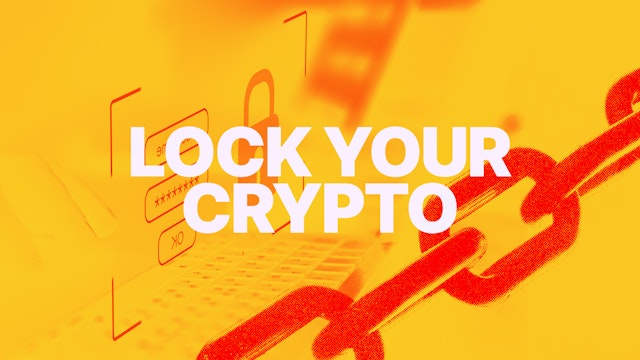Where to Keep Cryptocurrency: A Guide to Storing Digital Assets
Understanding the difference between self-custody and third-party storage to keep your private keys secure.
In this article...
- Cryptocurrency ownership is defined by who holds the "private keys" rather than where the digital file is stored.
- Self-custody gives you full control over your money, but all the security risk is on you.
- Third-party custodians feel more like a bank, but you have to trust them to protect your assets.

You just bought your first [Bitcoin])https://www.coinjar.com/buy/bitcoin) or Ethereum. You see the balance in your app and it feels real. Still, a fair question pops up: where is that money actually kept?
It is not in a physical vault. It is not even a file saved on your phone.
When you own cryptocurrency, what you really own is a secret code called a private key. This key is what lets you send or move funds on a blockchain. If you control the key, you control the crypto. If you lose the key, the crypto is effectively gone forever.
So when people ask where to store crypto, they are really asking how to manage and protect their private keys.
The Two Main Storage Methods
There are two primary ways to store cryptocurrency:
- You manage the keys yourself (self-custody).
- You use a professional service to manage them for you (third-party custody).
1. Third-Party Custody (Custodial Wallets)
This is how most beginners start. If you buy crypto on a centralized exchange and leave it there, you are using a custodial wallet.
Think of it like a regular bank account. You do not keep stacks of cash at home. The bank holds it and gives you online access. With crypto, the exchange or custodian holds the private keys and you log in with a username, password, and usually two-factor authentication.
Key features:
-
Convenience
The experience feels familiar. If you forget your password, you can reach out to customer support and go through an account recovery process. -
Liquidity
Your coins and tokens are ready to trade right away. You can buy, sell, or swap quickly without moving funds between wallets. -
Institutional-grade options
Larger investors often use regulated custodians known as qualified custodians. These providers use advanced security tools like Multi-Party Computation (MPC). MPC splits a private key into several pieces and spreads them across different devices or systems, so no single person can use the full key on their own.
For many US users who trade often or prefer a bank-like feel, custodial storage is the most practical entry point.
2. Self-Custody (Non-Custodial Wallets)
Self-custody means you are the only one who has your private keys. No exchange, no broker, no bank. Just you.
This matches a core crypto idea: “Not your keys, not your coins.”
Key features:
-
Control
You decide when and where to move your crypto. There are no bank hours, no withdrawal limits from a platform, and no one can freeze your wallet on your behalf. -
Protection from platform failures
If an exchange you once used goes bankrupt or gets hacked, your self-custodied assets are separate. They live on the blockchain and are only accessible with your keys, not on a company’s internal ledger. -
Responsibility
There is no “forgot my password” link for your wallet. Your recovery phrase (usually 12 to 24 words) is your backup. If you lose it, and you lose access to your device, your funds are almost always gone for good. There is no customer support line that can restore a lost recovery phrase.
Self-custody suits users who are comfortable with technology, patient with security steps, and willing to manage backups themselves.
Real-Life Examples of Storage Solutions
The tools you use will look very different depending on whether you choose self-custody or third-party custody.
Hot Wallets vs. Cold Wallets
If you choose self-custody, you also need to pick between hot and cold storage.
-
Hot Wallets (software)
These are internet-connected apps on your phone, browser, or desktop. MetaMask and Trust Wallet are two well-known examples.
Hot wallets are great for daily use, quick transfers, and interacting with decentralized apps (dApps). Because they are online, they are more exposed to phishing, malware, and other online attacks. -
Cold Wallets (hardware)
These are physical devices, often shaped like USB drives, that store your private keys offline. Popular brands include Ledger and Trezor.
Even when you plug a hardware wallet into a computer, the private keys stay locked inside the device. Transactions are signed inside the wallet, not on the computer. This offline design is widely viewed as one of the most secure ways for individuals to store significant amounts of crypto for the long term.
A common approach is to keep spending or trading amounts in a hot wallet and store larger holdings in cold storage.
Institutional Custodians
Large organizations cannot usually run their entire treasury from a single hardware wallet. US regulations, internal controls, and audit requirements often demand professional custodians.
Corporations, hedge funds, and ETF issuers may use providers.
These custodians:
- Store assets in multiple physical locations, often in secure vaults.
- Use strict internal controls so that no single person can move funds alone.
- Apply policies that require multiple approvals for each withdrawal or transfer.
For example, a fund might set a rule that any transfer above $100,000 needs digital approvals from the CFO plus two other managers. This reduces the chance of fraud or mistakes.
Risks and Red Flags
No matter where you keep your crypto, some risks never fully go away. You can only reduce them.
The Limits of Insurance
Many people assume that crypto platforms are insured like US bank accounts. That is usually not true.
FDIC insurance protects certain bank deposits up to specific limits. Most crypto holdings do not fall under that protection.
Reputable custodians may carry private insurance. It can sometimes cover theft, certain types of hacks, or physical damage to cold storage sites. Still, there are important limits:
- Coverage is capped. If losses are larger than the policy, not every client will be made whole.
- Insurance is often focused on third-party breaches or insider theft, not user mistakes.
If you click a phishing link, give your password to a scammer, or approve a malicious transaction in your wallet, insurance almost never covers that.
Always read a platform’s insurance and security disclosures carefully, especially if you are storing large amounts.
Security Best Practices
No setup is perfect, but you can dramatically improve your odds by following a few core rules.
-
Protect your seed phrase
For self-custody wallets, your recovery phrase is the master key.
Do not store it in email, note-taking apps, screenshots, or cloud storage like Google Drive or iCloud. These can be hacked.
Instead, write it down on paper or use a metal backup plate, then store it somewhere secure and private. -
Watch for phishing and fake sites
Scammers often create websites and apps that look almost identical to real exchanges or wallets. They try to trick you into typing your seed phrase or your login details.
Always double-check URLs, use bookmarks for important sites, and be skeptical of links sent by text, email, or social media. -
Diversify storage
If you hold a meaningful amount of crypto, consider splitting it across more than one location.
You might keep a small portion on a reputable exchange for active trading and hold the majority in a hardware wallet that you rarely connect.
This way, even if one layer is compromised, you do not lose everything.
Summary
Where you keep your cryptocurrency comes down to a trade-off between convenience and control.
If you trade often, or if you are not comfortable managing keys and backups, a reputable third-party custodian or exchange account can make more sense. You get an easier experience and account recovery options, although you are trusting a company to safeguard your funds.
If you are a long-term holder and you care most about independence and security, self-custody with a hardware wallet is usually the stronger choice. It requires more care and discipline, but you remove many of the risks tied to centralized platforms.
Keep in mind that cryptocurrency regulations in the US are still evolving, which may bring changes to custodial requirements and consumer protections over time.
In the end, the best storage method is the one you understand and can manage safely every day. You can also mix approaches so that your setup matches how often you trade, how much you hold, and how much risk you are willing to take.

Suggested Articles

CoinJar Lock Feature: How to Secure Your Account
The Lock feature is here! CoinJar has launched a new feature designed to give you greater control over your CoinJar account security. Read more
How to Use Wise to Withdraw Fiat from CoinJar
A simple way to move money from your crypto into a multi-currency account.Read more
From Fantom to Sonic: The Complete Guide to Swapping FTM for S
Everything you need to know about the Fantom network upgrade and how to migrate tokens.Read moreBrowse by topic
The above article is not to be read as investment, legal or tax advice and takes no account of particular personal or market circumstances; all readers should seek independent investment, legal and tax advice before investing in cryptocurrencies.
This article is provided for general information and educational purposes only. No responsibility or liability is accepted for any errors of fact or omission expressed therein. CoinJar, Inc. makes no representation or warranty of any kind, express or implied, regarding the accuracy, validity, reliability, availability, or completeness of any such information.
Past performance is not a reliable indicator of future results.
Your information is handled in accordance with CoinJar’s Privacy Policy.
Copyright © 2025 CoinJar, Inc. All rights reserved.
CoinJar, Inc. is a registered Money Services Business with FinCEN and licensed as a money transmitter, NMLS #2492913. For a list of states in which CoinJar, Inc. is licensed or authorized to operate, please visit here. In certain other states, money transmission services are provided by Cross River Bank, Member FDIC.
This site is protected by reCAPTCHA and the Google Privacy Policy and Terms of Service apply.

